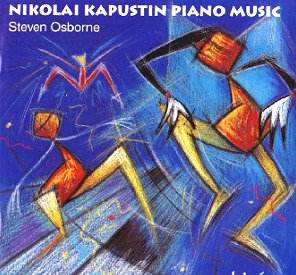NIKOLAI KAPUSTIN:
Piano Sonatas
Nos.1 "Sonata-Fantasia" (Op.39) & 2 (Op.54);
13 Preludes (from 24 Preludes in Jazz Style, Op.53)
 Steven Osborne (piano)
Steven Osborne (piano)
 HYPERION CDA67159
[69'20"]
HYPERION CDA67159
[69'20"]
Crotchet
Amazon
UK
Amazon
USA

The opening of Sonata No.1
reminds me of Debussy (Arabesque No.1).
Soon the atmosphere of a cocktail-bar is
suggested, a popular-type song (a 'thirties
standard perhaps but no doubt a Kapustin
original) is stated under rippling arpeggios.
Then a more pulsating 'commercial jazz'
arrives and very enjoyable it all is. Yet
Kapustin tells us this is a Sonata - and
that title brings with it a pre-conception
of structure and ambition. Well, it does
have four movements (linked) and lasts twenty
minutes (so ambition is achieved), but I
never felt the need to analyse it in structural
terms - and concluded that it doesn't require
to be intellectually explained. I am though
conscious that Kapustin is controlling his
material using a classical process (if not
clarifying purposeful structures). But the
actual music - always immensely likeable
- doesn't have any particular personality
of its own; the final result (for all Kapustin's
technique) could have been written (or improvised)
by any number of American jazz composers
or pianists. Yet Kapustin (born 1937) is
Ukrainian and is a jazz pianist, one who
was moonlighting as such when studying piano
with Alexander Goldenweiser at the Moscow
Conservatoire.
Russia and Jazz don't seem to go together - might not The State (certainly
during Kapustin's formative years) have found such a thing frivolous, decadent
and harmful? Whatever, Kapustin's had a thriving career as a jazz pianist
and this, as Steven Osborne writes in the booklet notes, has had a significant
effect on his own music - and Kapustin's a prolific composer, one classically
trained. But is all his stuff like this? One does want to hear more, to sample
something Kapustin's written for an instrument other than his own, to hear
something not as jazz-saturated as all the music on this CD. And that's the
point. Whether Sonata or Prelude (note there are 24 of the latter, which
follow, Osborne reveals, Chopin's order of keys) there is a sameness of
expression, which, while consistently attractive, does become repetitive
and anonymous. I don't feel I know this composer. Is there anything of Kapustin's
circumstances in his music? What is being alive like for Kapustin? Need such
biography be in his music? Am I unfairly looking for a Shostakovich-like
chronicle?
Osborne mentions the likes of Errol Garner, Art Tatum and Paul Desmond when
considering his selection of Kapustin's music. (I occasionally thought of
Billy Mayerl.) If that mix appeals, then buy this CD with confidence. As
I'm happy to repeat, I enjoyed every second of it and will return with pleasure.
Yet more questions are asked than answered. When the Second Sonata begins,
it could be another Prelude (and I would have preferred all the Preludes
in preference to this Sonata - the longest piece at 24 minutes and the most
derivative although the last movement is a tour de force). So let's have
some more Kapustin, something more personal. No doubts about Steven Osborne's
brilliant and dedicated playing or the typically superb production and sound
of another top-drawer Andrew Keener/Tony Faulkner collaboration.
Reviewer
COLIN ANDERSON

